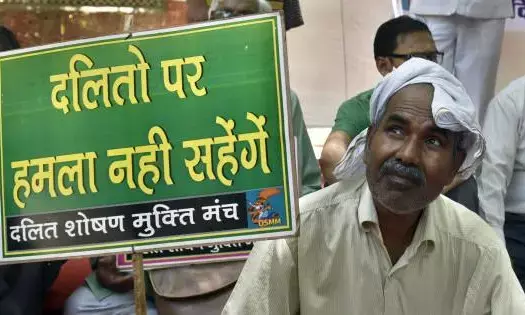No Country For Dalits
The community continues to be subjected to dehumanising attacks

Even as Karnataka’s Congress government finds itself tied up in knots over the controversial caste census report, it has been jolted by a deplorable crime. On December 10, in Belagavi district a Dalit woman was dragged outside her house, and as reported by India Today and other media houses, she was “stripped naked, tied to a pole, and thrashed by the family of a girl with whom her son had eloped”.
The government had recently held the ten-day winter session of the Assembly in the same district. Chief Minister Siddaramaiah hopes to woo the Dalit community through the caste report, keeping the forthcoming Lok Sabha elections in mind.
After this heinous crime against a Dalit woman, the state government has come under attack from the Opposition as well as the court over “its failure to prevent it”. However, this is not the first time that the state has reported such atrocities on the underprivileged sections, notwithstanding the howls of protests by the opposition Bharatiya Janata Party in the state, and the ruling Central government.
Immediately after such incidents come to light, the governments concerned move quickly to provide some relief to the victims. This has also been done by the Karnataka government which has reportedly granted some land to the traumatised woman in Belagavi. So far, the 13 accused in this assault case have been arrested. However, there is rarely a determined effort to eliminate recurrence of such violence.
The victim’s ‘fault’ in this case, was that her son eloped with a girl from the village, infuriating sections of the community there. The BJP’s state unit took to the streets to protest. The party also formed a fact-finding committee, and a three-member team of the National Commission for Scheduled Tribes landed in the state to look into the case.
Barely a few days after the Belagavi shocker, a group of Dalits from Rottigavad village in Dharwad complained about a divide in their community. According to them, the barbers in their village have refused to give them haircuts, following orders from members of the ‘upper caste’.
“We have to travel to Hubballi for haircuts, spending over Rs 500 and more,” the Dalits alleged, adding that they were also not allowed to sit on chairs in restaurants, and were forced to sit on the stairs. “All because the restaurant owners do not want us to sit with their customers,” Hindamani, one of the protesters, claimed.
It is important to recall that in 2022 three Dalits were killed in Tumkur in Karnataka when the state was under the BJP government. The accused belonged to the ‘upper caste’ who were annoyed that the Dalits sought to build a temple in their village.
According to the FIR registered by the local police at that time, the accused “were angered by the move”, and that led to the three Dalits being killed.
While criticism and politicisation of such incidents are common, one cannot forget how the now former Chief Minister of Madhya Pradesh, Shivraj Singh Chouhan, publicly washed a Dalit’s feet, after the news of a BJP supporter urinating on him went viral.
This was done purely with an eye on the forthcoming Assembly elections. However, in the same state a Dalit was beaten to death in Sagar district. It is alleged that the victim was killed by men who were forcing him to withdraw a 2019 sexual harassment case filed against them by his sister.
The development brought forth a sharp attack on the Chouhan government by Congress President Mallikarjun Kharge. He alleged that the ruling party had made Madhya Pradesh a “laboratory for atrocities on the Dalits and other backward classes”.
Accordingly, while the development in Karnataka is indeed condemnable, it is crucial that politicians ensure that such incidents are not repeated.
It is in this context that the Karnataka High Court’s call for collective responsibility needs to be looked at seriously, as it is not limited to the passive onlookers of such violence. Petty politics needs to end where such atrocities are concerned.


